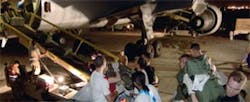To move 35,000 troops in and out of Southwest Asia each month, Airmen and fellow servicemembers are called to action as soon as the crew door opens upon landing.
"What separates us from all other air terminals is that here, passengers become troops as soon as the plane lands," says Maj. Charlene Purtee, 8th Expeditionary Air Mobility Squadron director of operations.
"With limited manpower and high ops tempo, we have no choice but to call upon passengers for help," the major says. That help comes from an "all-volunteer" 30-member baggage detail organized by aerial transporter, Master Sgt. Eric Gadow, who uses the plane's intercom to rally the travel-weary and sometimes reluctant passengers.
As Airmen hear Sergeant Gadow's call for volunteers, they are simultaneously taking in their first, thick, saucy waft of hot desert air. Those sitting closest to the door begin looking at each other as if trying to wish themselves invisible.
"If I don't get my 30 volunteers on the first call, inform the plane that my next call will be for all E-1 through E-3s (the lowest enlisted grades) and that usually gets 'em," Sergeant Gadow states.
As volunteers assemble on the tarmac, desert camouflage uniform blouses are removed and ice-cold bottles of water are handed out along with leather gloves, ear protection and reflective belts. As the baggage detail is led to the cargo hull of the plane to begin off-loading the bags, the remaining passengers are led to a temperature-controlled tent where they receive their indoctrination brief.
Unbeknownst to those who didn't volunteer for the baggage detail at the end of their briefing, they will unload the same baggage arriving from the plane in 30-foot trailers. In the end, everyone manifested on the plane is involved in the baggage handling process.
To some passengers, like Staff Sgt. Vickie Sennet, a personnelist from Creech Air Force Base, Nev., who is starting her third desert deployment, the baggage handling detail came as no surprise.
"Having done this before, I pretty much knew what to expect - so everything has gone smoothly this deployment," says Sergeant Sennet, a veteran of deployments to Afghanistan and Pakistan.
Her advice to those deploying for the first time: Always look, listen and follow the more experienced members.
They will always steer you in the right direction and help you maintain the proper mindset.
Moving troops throughout the area of responsibility is not only dependent on the right attitudes and actions, but it requires hard work and motivation of nearly 300 people at the base's reception team.
During his first week on the job, aerial porter Tech. Sgt. Ben David says hearing the emotional testimonies of medical personnel returning home from downrange made him aware of how critical his role is in keeping things flowing.
"These folks had seen some wild stuff," says the sergeant from Hill AFB, Utah. "It suddenly dawned on me how important it is to quickly move people."
Sergeant David and his fellow 8th Expeditionary Air Mobility Squadron team members work 12-hour days, seven days a week, with no days off during peak rotation schedules.
"If newly arrived members think they're being treated unfairly by being asked to move their own luggage, they need to consider how hard our base's reception team works to keep personnel flowing," Major Purtee states.
"We're not asking for sympathy, we just want empathy.





